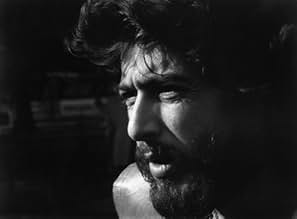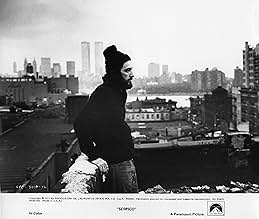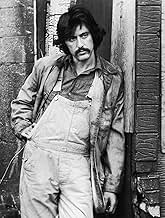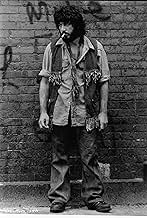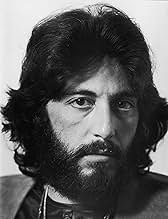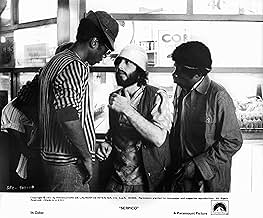Ein ehrlicher New Yorker Polizist namens Frank Serpico pfeift über die grassierende Korruption in der Macht, nur um seine Kameraden gegen ihn wenden zu lassen.Ein ehrlicher New Yorker Polizist namens Frank Serpico pfeift über die grassierende Korruption in der Macht, nur um seine Kameraden gegen ihn wenden zu lassen.Ein ehrlicher New Yorker Polizist namens Frank Serpico pfeift über die grassierende Korruption in der Macht, nur um seine Kameraden gegen ihn wenden zu lassen.
- Regie
- Drehbuch
- Hauptbesetzung
- Für 2 Oscars nominiert
- 8 Gewinne & 13 Nominierungen insgesamt
Barbara Eda-Young
- Laurie
- (as Barbara eda-Young)
Edward Grover
- Lombardo
- (as Ed Grover)
Albert Henderson
- Peluce
- (as Al Henderson)
Joseph Bova
- Potts
- (as Joe Bova)
Woodie King Jr.
- Larry
- (as Woodie King)
Empfohlene Bewertungen
(1973)
Sidney Lumet's Serpico is based on such a compelling story, and is told so well, you really can't not like it. Al Pacino dominates, and he is in every scene. This means the movie is based almost literally on what Frank Serpico saw and did as a moral and unshakeable cop in New York just before the film was made.
It's filmed with gritty realism but without sensationalism, though you might say a little artlessly, too, as if Lumet just wants to get the job done and not get in the way. In fact, Lumet wasn't involved in pre-production, called in just a filming was to start, so there might be a disconnect there. The support cast--mostly other cops plus two sometimes convincing girlfriends--is very good, though very few of them are developed at all.
So it's a very good film with a great story--a plain enough summary of a movie that won't let you go. But wait, you do have to let Pacino take a bow for another absorbing, intense performance. It's his movie. And Frank Serpico, who just saw it for the first time last year, after carefully avoiding it for almost forty years. A great article of the real Serpico from January 2010 can be found by typing "Serpico on Serpico" in google, and look for the New York Times article, worth the fast read!
Sidney Lumet's Serpico is based on such a compelling story, and is told so well, you really can't not like it. Al Pacino dominates, and he is in every scene. This means the movie is based almost literally on what Frank Serpico saw and did as a moral and unshakeable cop in New York just before the film was made.
It's filmed with gritty realism but without sensationalism, though you might say a little artlessly, too, as if Lumet just wants to get the job done and not get in the way. In fact, Lumet wasn't involved in pre-production, called in just a filming was to start, so there might be a disconnect there. The support cast--mostly other cops plus two sometimes convincing girlfriends--is very good, though very few of them are developed at all.
So it's a very good film with a great story--a plain enough summary of a movie that won't let you go. But wait, you do have to let Pacino take a bow for another absorbing, intense performance. It's his movie. And Frank Serpico, who just saw it for the first time last year, after carefully avoiding it for almost forty years. A great article of the real Serpico from January 2010 can be found by typing "Serpico on Serpico" in google, and look for the New York Times article, worth the fast read!
Unquestionably one of the major films of the 70's dealing with a big theme (police corruption) and with some major talents at close to the top of their game throughout. Sydney Lumet spares us little in this gritty urban drama using almost fly-on-the-wall documentary technique to involve the viewer in the action and stand us directly alongside Pacino as crusading street-wise cop Frank Serpico. Serpico's naive idealism is at first bruised by what at first seems casual freeloading by almost everyone of his new colleagues on the force but which turns to literally a battering as he comes to appreciate just how endemic the inside corruption actually is. Lumet plants us firmly on location in contemporary downtown NY with its rundown apartment blocks, graffiti-strewn streets and lowlife criminal element (and that's just the police!) As for Serpico, we feel his frustration as he cracks under the pressure, his relationship with his girlfriend poisoned as he fails to make the powers-that-be sit up and address what to all intents and purposes is standard behaviour. It takes a great acting performance to carry the viewer all the way through this lonely journey, even when the character himself becomes at times obnoxious and unfeeling to his (few) supporters; thankfully Pacino gives a performance the real-life Serpico deserved. Only very occasionally lapsing into the "hoo-ha" overacting style that reached its nadir in "Scent Of A Woman", Pacino plays it cool and tight throughout, always wary, always looking over his shoulder, playing it for real. If one is slightly sceptical if not critical of his sometimes ridiculous-looking "Harry Hippy" persona, I think it can be forgiven as being of its time. The ensemble support acting is top-drawer too, everyone is believable as indeed they need to be to make this film work but particular praise should go to Barbara Eda-Young as his put-upon girlfriend and Tony Roberts, free of Woody Allen for once, as his main ally. It's not hard to see the prototypes here for the new generation cutting-egde TV shows which were soon to follow such as Kojak and particularly Hill Street Blues, but that's the least of this film's achievements. In summary then, this excellent film is proof that it's possible for Hollywood to address a potentially unpopular, certainly uncomfortable serious subject, make its point and still entertain.
Sidney Lumet is a director who captures something crucial in city based dramas surrounding legal and political affairs; with films like '12 angry men', 'the verdict', 'nightfalls on Manhattan' and 'Q & A' he shows an excellent grasp of the power plays in civic politics. In 'Serpico' he uses an excellent script to tell the story of an unorthodox character in Frank Serpico, a hippie in a time when most cops were square as a doorway but whose honesty when faced with police corruption marks him out as a man of remarkable character. Unflinching in its depiction of Serpico, the film portrays warts and all, over the period in which he refuses to take money and shows his extraordinary political vindication at an official investigation into NYPD corruption. The story of civic corruption is cogent in any time, one only has to look at great empires like Rome to understand how much corruption plays a part in the shaping of so called civilizations; where the very foundation stones have bodies, so to speak, buried under them or even within them. This film is both informative and honest in much the way 'All the Presidents Men' would be in the following year. Winning Al Pacino a deserved Oscar nomination in the years between the Godfather's Part I and II; it demonstrates the range of an actor who would go on to portray a character in Michael Corleone soon afterwards who is the very nemisis of the character in Serpico. In Serpico there is a dramadocumentary that calls to mind Shakespeares history plays in its depiction of a classical situation of a man ostracized and driven by noble sentiments to embody something of the civic value one expects of servants of the public trust. Brilliant film. 10 out of 10.
Frank Serpico begins his career with the NYPD as an idealistic rookie who believes in the moral value of policing. He has a simple and old-fashioned ethical code, an outlook which used to be known as honesty. What he finds is a moral sewer, five boroughs wide, in which almost every cop is on the take. The police are just another gang of hoodlums, but with more guns than the bad guys. Even basically decent cops go along with the kickback culture, because a locker-room psychology prevails in which values have become perverted. Squad loyalty is now a criminal conspiracy of silence. Detectives do not hesitate to shake-down hoods who are slow to pay. To Frank Serpico, this is simply wrong. He wants no part of it. And so his long agony begins.
Both responding to and helping to shape the mood of its time, a weary cynicism towards authority, "Serpico" arrived on the screen just as Watergate built to its climax. Americans could no longer regard their institutions as gleaming examples to mankind of optimism and good government. The film begins gloomily with Serpico badly wounded, having been shot in the face. We hear police and ambulance sirens fading, symbolically representing the life-force ebbing from Frank, and the withering of American dreams.
This first-class film is a triumph, and one that could easily have misfired. Had the crooked cops been depicted as mere thugs, then Serpico himself would have been an archetype, just another two-dimensional crusader. What gives the film its psychological richness is the realisation that the dishonest cops are NICE. These are affable, reasonable men who want to like Serpico and want to welcome him onto the team. The camaraderie is seductive and it's difficult for Frank to hold out against it. He is besieged by self-doubt, wondering if he is just a one-man awkward squad, or worse - a prima donna, sacrificing personal relationships on the altar of his own ego.
Again, the easy (but disastrous) course would have been to give Frank some big heroic speeches, allowing him to inveigh against corruption. The film chooses instead to go for psychological truth, and this is what makes the project outstanding. Appalled, afraid and despairing of ever changing anything, Frank withdraws into himself. He becomes the spectre at the feast, the silent rebuke, the muted but ever-present conscience of his colleagues.
Though Frank rejects the golden shield which is eventually offered, we feel that the system still means something. There are still some honest cops, and even after all these vicissitudes, the United States is still a nation of laws. Lumet's profoundly liberal and optimistic view of America ultimately shines through, but the final mood is one of quiet resignation rather than triumphalism. Right can prevail over wrong, but a price has to be paid. Serpico wins his titanic struggle, but he is diminished and saddened as a man.
The film contains some marvellous technical things. In the opening minutes, the action cuts between Frank as he is now (wounded, broken and alone) and as he started out (the clean-cut, idealistic rookie). These transitions are seamless, and the narrative logic is smooth and natural. We see Frank's first moment of disenchantment in a cafeteria when it dawns on him that cops get free handouts of food, but they have to take whatever comes. This first bewilderment develops until we see the gulf open up between Frank and the dishonest cops, the ones who take the money but also take the self-loathing.
The terrible stress to which Frank is subjected is depicted with skill. The police department has a huge institutional inclination to protect its own, and this vast weight is brought to bear on Serpico. Equally, the pressure is relieved cleverly at appropriate points in the narrative. Frank's 'collar' of Rudi Casaro reaches an explosive climax as this all too human guy reaches breaking-point. On the other hand, the romantic story-telling interlude with Laurie and Serpico's undercover cameo as an orthodox rabbi break the tension and vary the pace beautifully.
The second-unit work is of a uniformly high standard. We are shown atmospheric New York streetscapes with grubby brownstones and the massive, overbearing masonry of the Brooklyn Bridge, in knowing homage to the films noirs of twenty years earlier. The symbols are powerful. This city, and this police department, are too colossal for one man to stand against them. Practice sessions in the police firing gallery intelligently reinforce the film's undercurrent of foreboding. Paper targets obscure the gunmen's faces, suggesting a monolithic force united against Frank, then come hurtling towards him on pulleys, signifying the fate which is rushing to meet him.
Mikis (Zorba the Greek) Theodorakis has provided a classy score. I particularly liked the jazzy, minor-key horn passage.
Pacino puts in another of the towering performances which have distinguished him as the profoundest acting talent of his era. He is simply wonderful. Barbara Eda-Young gives top-notch support as Laurie, the genuinely loving partner who is destroyed by her man's seeming eagerness for martyrdom in rejection of domestic happiness. If ever an actor exuded confidence it's Tony Roberts, and he is ideally cast as Bob Blair, Serpico's well-connected ally. Though he can open City Hall doors, he can't actually help Frank at all. Nobody can. Christ-like, Frank understands that it is ordained - he must go to the hill alone.
Both responding to and helping to shape the mood of its time, a weary cynicism towards authority, "Serpico" arrived on the screen just as Watergate built to its climax. Americans could no longer regard their institutions as gleaming examples to mankind of optimism and good government. The film begins gloomily with Serpico badly wounded, having been shot in the face. We hear police and ambulance sirens fading, symbolically representing the life-force ebbing from Frank, and the withering of American dreams.
This first-class film is a triumph, and one that could easily have misfired. Had the crooked cops been depicted as mere thugs, then Serpico himself would have been an archetype, just another two-dimensional crusader. What gives the film its psychological richness is the realisation that the dishonest cops are NICE. These are affable, reasonable men who want to like Serpico and want to welcome him onto the team. The camaraderie is seductive and it's difficult for Frank to hold out against it. He is besieged by self-doubt, wondering if he is just a one-man awkward squad, or worse - a prima donna, sacrificing personal relationships on the altar of his own ego.
Again, the easy (but disastrous) course would have been to give Frank some big heroic speeches, allowing him to inveigh against corruption. The film chooses instead to go for psychological truth, and this is what makes the project outstanding. Appalled, afraid and despairing of ever changing anything, Frank withdraws into himself. He becomes the spectre at the feast, the silent rebuke, the muted but ever-present conscience of his colleagues.
Though Frank rejects the golden shield which is eventually offered, we feel that the system still means something. There are still some honest cops, and even after all these vicissitudes, the United States is still a nation of laws. Lumet's profoundly liberal and optimistic view of America ultimately shines through, but the final mood is one of quiet resignation rather than triumphalism. Right can prevail over wrong, but a price has to be paid. Serpico wins his titanic struggle, but he is diminished and saddened as a man.
The film contains some marvellous technical things. In the opening minutes, the action cuts between Frank as he is now (wounded, broken and alone) and as he started out (the clean-cut, idealistic rookie). These transitions are seamless, and the narrative logic is smooth and natural. We see Frank's first moment of disenchantment in a cafeteria when it dawns on him that cops get free handouts of food, but they have to take whatever comes. This first bewilderment develops until we see the gulf open up between Frank and the dishonest cops, the ones who take the money but also take the self-loathing.
The terrible stress to which Frank is subjected is depicted with skill. The police department has a huge institutional inclination to protect its own, and this vast weight is brought to bear on Serpico. Equally, the pressure is relieved cleverly at appropriate points in the narrative. Frank's 'collar' of Rudi Casaro reaches an explosive climax as this all too human guy reaches breaking-point. On the other hand, the romantic story-telling interlude with Laurie and Serpico's undercover cameo as an orthodox rabbi break the tension and vary the pace beautifully.
The second-unit work is of a uniformly high standard. We are shown atmospheric New York streetscapes with grubby brownstones and the massive, overbearing masonry of the Brooklyn Bridge, in knowing homage to the films noirs of twenty years earlier. The symbols are powerful. This city, and this police department, are too colossal for one man to stand against them. Practice sessions in the police firing gallery intelligently reinforce the film's undercurrent of foreboding. Paper targets obscure the gunmen's faces, suggesting a monolithic force united against Frank, then come hurtling towards him on pulleys, signifying the fate which is rushing to meet him.
Mikis (Zorba the Greek) Theodorakis has provided a classy score. I particularly liked the jazzy, minor-key horn passage.
Pacino puts in another of the towering performances which have distinguished him as the profoundest acting talent of his era. He is simply wonderful. Barbara Eda-Young gives top-notch support as Laurie, the genuinely loving partner who is destroyed by her man's seeming eagerness for martyrdom in rejection of domestic happiness. If ever an actor exuded confidence it's Tony Roberts, and he is ideally cast as Bob Blair, Serpico's well-connected ally. Though he can open City Hall doors, he can't actually help Frank at all. Nobody can. Christ-like, Frank understands that it is ordained - he must go to the hill alone.
Al Pacino is one of the best actors around, and he has many definitive roles. His role as Frank Serpico is certainly one of them. He acts with such charm and smoothness in some scenes, while explosive and intense in others.
The movie gets into a big plot line about police corruption and Serpico blowing the whistle on the department. It's interesting and the whole point of the movie, but the reason this is such a good movie is because of the character, not the plot. The better scenes include Serpico's personal life and struggles. There's one great part where he explains to his girlfriend why he's always wanted to be a cop. It's scenes like those that make you sympathetic for him.
Sidney Lumet and Pacino made a great team for this movie, and proved to be a great team for Dog Day Afternoon a few years later. But as good as a director Lumet is, as good as everyone involved with this movie is, this is Pacino's movie. It's an essential viewing for his fans.
My rating: 9/10
The movie gets into a big plot line about police corruption and Serpico blowing the whistle on the department. It's interesting and the whole point of the movie, but the reason this is such a good movie is because of the character, not the plot. The better scenes include Serpico's personal life and struggles. There's one great part where he explains to his girlfriend why he's always wanted to be a cop. It's scenes like those that make you sympathetic for him.
Sidney Lumet and Pacino made a great team for this movie, and proved to be a great team for Dog Day Afternoon a few years later. But as good as a director Lumet is, as good as everyone involved with this movie is, this is Pacino's movie. It's an essential viewing for his fans.
My rating: 9/10
Wusstest du schon
- WissenswertesThe film was shot in reverse order. Al Pacino began with long hair and a beard, then for each scene, his hair and beard were trimmed bit by bit until he became clean-cut.
- PatzerThe prison "chain gang" being led into the wagon at the beginning has male and female prisoners on the same "chain," and both sexes are transported in the same wagon. The NYPD absolutely forbade that then, and still does.
- Zitate
Frank Serpico: The reality is that we do not wash our own laundry--it just gets dirtier.
- Alternative VersionenThere is one Australian VHS version released through RCA Columbia Pictures Hoyts Home Video in the 1980s which had all profanity overdubbed with tamer language, as well as some scenes of sexuality/nudity. Subsequent releases on DVD are uncensored.
- VerbindungenEdited into The Kid Stays in the Picture (2002)
Top-Auswahl
Melde dich zum Bewerten an und greife auf die Watchlist für personalisierte Empfehlungen zu.
- How long is Serpico?Powered by Alexa
Details
- Erscheinungsdatum
- Herkunftsländer
- Offizieller Standort
- Sprachen
- Auch bekannt als
- Serpiko
- Drehorte
- Lewisohn Stadium, Amsterdam Avenue, Manhattan, New York City, New York, USA(Meeting Scene with Bob Blair)
- Produktionsfirmen
- Weitere beteiligte Unternehmen bei IMDbPro anzeigen
Box Office
- Budget
- 3.000.000 $ (geschätzt)
- Bruttoertrag in den USA und Kanada
- 29.800.000 $
- Weltweiter Bruttoertrag
- 29.858.717 $
Zu dieser Seite beitragen
Bearbeitung vorschlagen oder fehlenden Inhalt hinzufügen



